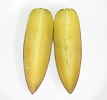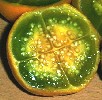Exotic plants, shrubs
and trees
Decorative type with green fruits turning yellow, orange and then red. Packet of more than 25 seeds: $2,49


Black
Goji
(Lycium
ruthenicum)
New for
2025
Perennial from Central Asia bearing dark purple
berries that can be eaten fresh or dried. Taste
is simlar to sunberry or blackberry nightsahde.
Highly pigmented and full of antioxydants. (...)
See
New
for 2025
For another species of Lycium, see also below "Lycium -
Chinese Boxheart".
Relative of the Tree Tomato or Tamarillo (Cyphomandra
betacea), this species is more manageable (1,5 to 1,8 m)
and has a shorter cycle. It blooms the first year, a few months
after sowing. The crowns of small white flowers are followed by
small, 1 inch decorative berries. Some say these fruits are
edible and have a nice flavor (like peach or apricot), though
the ones we grew did not taste great at all (climate? strain?).
Large, tropical looking downy leaves. Place it outside during
summer. Rare. South America.
Packet of 35 seeds: $2,99
 Ashwagandha
Ginseng
indien (Withania somnifera)
Ashwagandha
Ginseng
indien (Withania somnifera)
Medicinal plant used for centuries in India for its therapeutic
virtues. Strengthens body and mind, alleviates insomnia,
rheumatoid arthritis, etc. Relieves stress. All parts of the
plant can be used. Steeped leaves makes a calming tea. Height:
40-60 cm (here). Easy to grow (easier than chinese ginseng).
Full sun. Tender perennial treated as an annual.
Lower germination rate (25%), but packet increased to 50 seeds,
enough to grow about a dozen plants.
Packet of 50 seeds: $2,49



Litchitomato Morelle de Balbis (Solanum sisymbrifolium)
White to pale blue flowers followed by decorative, 1 inch red
berries. Spiny plant, about 1 to 1,5 m high. Click on photos for
details. Fruits are edible but rather bland. Blooms from July
until frosts.
Packet of 15 seeds: $2,49



Lycium - Chinese Boxheart (Lycium barbarum)
Small 3 foot shrub with edible red berries. Fruits are consumed
fresh or dried like raisins. They are also used as an ophthalmic
herbal medicine in China and were included more recently in some
dietary supplements. The dried berries taste somewhat like
cranberries and have a very high content of beta carotene. Aka:
Chinese boxthorn, Matrimony vine.
Packet of 40 seeds: $2,99




Melon Pear (Solanum muricatum, Pepino Melon, Pepino Dulce)
The Melon Pear, aka Pepino Melon, is a native of the Andes producing wonderful fruits with a flavor reminiscent of honeydew melon and pear. Yellow flesh, tender and very juicy. Potato foliage with flowers similar to those of eggplants. Fruits are oval to elongated, pale yellow to dark purple, with varying degrees of purple striping*. Plants tend to crawl and may need staking. Approximately 50 cm tall. Also called Pepino Dulce. Popular fruit in Peru. Germination +- 60%. Limited supply.
Sold out.
* Fruit shape and size vary from plant to plant, an so are the leaves (from pale green to dark purple) and flowers (white to purple). The dark-leafed plants grows the long striped fruits.
Plants are self-fertile but pollination can sometimes be an issue for some of them. Grow more than one plant if possible.
It is possible to grow melon pears in Quebec if you start sowing early, either in February or March. It is very easy to make cuttings from this plant. You can clone it almost indefinitely. Just snap a branch and put it in water (or stick it right into the ground). Potted plants overwinter very well in a garage or a cold room. Even if they seem dead, they can grow back new shoots in spring. Obviously, greenhouse cultivation would be best as it allows for a longer growth period and for more fruits to ripen in the fall. But even the unripe fruits are edible; in fact some people prefer them at this stage and use them in salads, the same way as cucumbers. You can put the unripe fruits in a bag with some apples and they will slowly ripen over several weeks. You can tell they are ripe when they release a sublte, sweet smell similar to a melon or a banana.



Naranjilla Lulo (Solanum quitoense)
Large subtropical plant from the andean plateau where it is grown for its delicious orange fruits. National fruit of Ecuador. Small, 3 to 5 cm orange fruits covered with fuzz. Beautiful emerald green pulp with tropical fruit flavor. To make a refreshing juice, simply add sugar and water. Ornamental plants with large purple veined leaves covered with a soft, downy fuzz. Height: 1,5-1,8 m. Needs 8 months of growth to produce fruits. May need hand pollination to set fruit. Also called "Lulo". Columbian strain covered with spines and producing larger fruits. Germination: 2-3 weeks.
Packet of 15 seeds: $2,99
 Paulownia
(Paulownia tomentosa,
Empress tree)
Paulownia
(Paulownia tomentosa,
Empress tree)Perennial. Fast-growing deciduous tree with nice scented flowers looking somewhat like snapdragons or foxgloves. Large, heart shaped leaves about 4 to 8 inches wide. Blooms in spring with 2 inch purple flowers. Can grow 6 or 7 feet in one season. Perennial to zone 6 and warmer parts of zone 5 (like Montreal). Protect from winter the first year. Seeds needs light to germinate.
Packet of 50 seeds: $2,99
 Kangaroo Apple
(Solanum laciniatum)
Kangaroo Apple
(Solanum laciniatum)
Tall plant with deeply cut foliage and small purple flowers
followed by small, 2-3 cm egg shaped fruits. Settlers in New
Zealand and Australia picked the fruits to make jam. If you want
ripe fruits, and you live in the north, you will have to bring
the plant inside for the fruits to mature (around december).
Also known as "Poroporo". Sow inside several weeks before last
frost. 1,5 to 2 m tall. Low germination (50%), barely cover
seeds.
Packet of 25 seeds: $2,49


Tamarillo Tree Tomato (Cyphomandra betacea)
Small subtropical tree bearing clusters of 3-4" egg shaped red
fruits looking somewhat like tomatoes. Can be grown outdoors
year-round in frost free areas or as a big container plant that
can be placed outside in the summer. The sweet-tart, acidic
fruits have a meaty pulp and bring to mind the flavors of
tomato, orange and lime. Can be used raw but also in any
imaginable way (cooked, preserved, jams, juice, etc.). A high
yielder after one year of growth.
Packet of 8 seeds: $2,99

